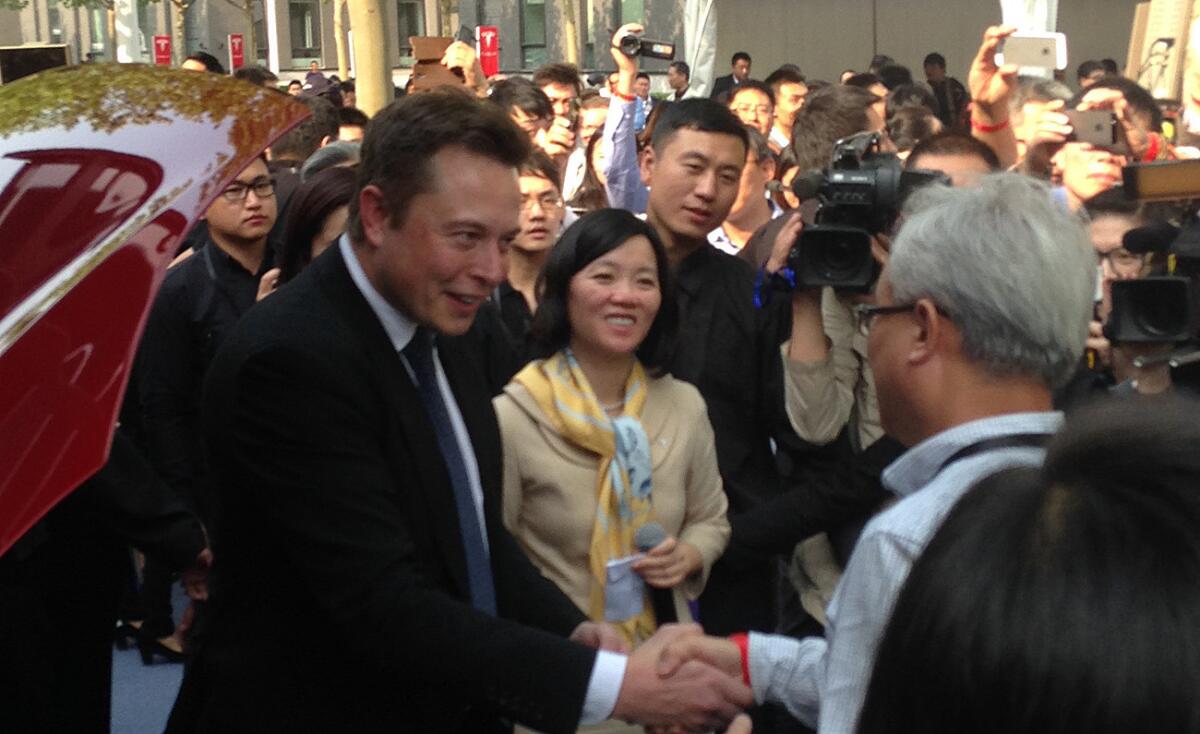Tesla delivers its first electric cars in China; delays upset some

BEIJING -- Thanking his Chinese customers for “taking a chance,” Tesla Chief Executive Elon Musk on Tuesday handed over the keys to the first nine electric vehicles the California car company has sold in the country.
Plugging in a Model S at Tesla’s first “supercharger” station in front of the company’s offices in northeast Beijing, Musk vowed to build a nationwide network of the high-speed chargers -- which can deliver enough power for a 340-mile journey in about an hour -- “as fast as we can.”
“We want to make sure people are able to travel almost anywhere within China using the supercharger network,” he said. “I know some customers are interested in doing cross-country journeys and that kind of thing, so you can expect to see many of these around the country.”
TESLA SALES: Have they topped out?
China has set a target of having 5 million electric vehicles on its roads by 2020 as part of efforts to curb pollution, and other automakers are closely watching to see if Tesla can win over consumers in the market. The Palo Alto-based company began taking orders from Chinese customers late last summer and opened its first retail showroom in an upscale Beijing shopping mall at the end of 2013.
Authorities in Beijing -- where residents must enter a lottery for license plates -- recently held a special auction for electric-vehicle license plates but found the demand fell short of supply. The government also offers special incentives to buyers of Chinese-made electric vehicles, but Tesla does not qualify for the program.
Among the first nine buyers to receive their Model S cars -- which sell for about $122,000 in China -- were influencers such as Cao Guowei, CEO of Internet company Sina, and Yu Yongfu, chief executive of the mobile Internet browser company UCWeb.
But among the crowd was at least one disgruntled customer who said he had placed orders and handed over deposits but had yet to receive a straight answer from the company on when the cars would be delivered.
Wang Lifeng, CEO of the Anytime Anywhere car rental service, said his company placed an order for 100 cars in January, putting down about $41,000 each for the first 10 cars and $1,600 for the remaining 90. But Tesla, he said, had asked him several times since then to cancel the order.
“I know it’s hard to start a car company from zero, but there are some things they can do better,” said Wang’s colleague, Helen He. “We are disappointed. We want to receive at least one or two cars to start training our staff.”
Asked about Wang’s complaint, Tesla spokeswoman Peggy Yang said she couldn’t immediately comment.
Wang and He said they had discussed their order with Tesla’s China general manager, Kingston Chang, but Tesla announced late last month that he had left the company.
Other expectant Tesla owners at Tuesday’s launch expressed a willingness to wait.
“I just love Elon Musk. Whatever he makes, I’ll buy it -- except his rockets, those are too expensive,” joked Bob Liu, vice chairman of the Jiangsu Weitian Chemical Co., who showed up at Tuesday’s Tesla launch event.
Liu said he had ordered four Teslas for his company’s senior managers. “They say maybe I’ll get them around July; I think September,” Liu said. “These things happen with a new company.”
Liu said the price of the Tesla was reasonable. “We can afford it. $120,000 is not a lot for a car like this in China -- everyone around me drives a 1-million renminbi [$166,000] car,” he said.
“It’s not something to brag about,” he said. “If you drive a Bugatti, that’s something to brag about.”
Tommy Yang in the Times’ Beijing bureau contributed to this report.







